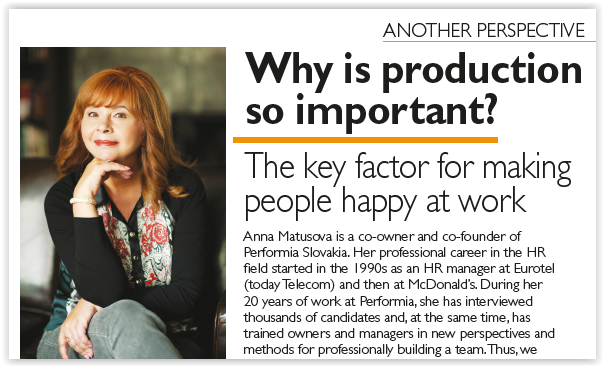
Why is production so important?
The key factor for making people happy at work
Anna Matusova is a co-owner and co-founder of Performia Slovakia. Her professional career in the HR field started in the 1990s as an HR manager at Eurotel (today Telecom) and then at McDonald’s. During her 20 years of work at Performia, she has interviewed thousands of candidates and, at the same time, has trained owners and managers in new perspectives and methods for professionally building a team. Thus, we decided to ask her for her viewpoint on production.
I have been representing Performia in Slovakia for more than 20 years now. We try to inform the current business world about a few basic factors that are part of our technology, and that are important not only when doing hiring but also when building a good team.
One specific, stable type of data that you can always count on when working with personnel is PRODUCTION. In other words, THE RESULTS of any activity. What you need from employees is simply to get the job done. If this takes place, you will avoid a lot of problems. What I say might sound a bit harsh, but you should pay your employees for their actual production.
To understand this better, it is good to look at the origin of the word PRODUCTION. It comes from Latin and consists of two parts: pro and ducere. (Pro-) is a prefix that means forward, to move something forward. (Ducere) means to lead or to carry. In the figurative sense, we could say that a “product” is something that we made somewhere behind the scenes, and only once it was fully complete was it brought forward with pride and put on display. We see this often in restaurants, where what we get on the table is nothing else but a completed product. A product is something for which you do not need to add or improve anything.
I have already mentioned that employees should be paid for their actual production. If an employee is getting paid for something that he is not really producing, the consequences over time would be a decline in willingness, responsibility, respect for the company, respect for managers, worsening quality of his work, etc. Such a person will most probably spread his dissatisfaction to others in the company, and it could then continue to spread like a plague. Eventually, even the people who were once on your side will start to resist and revolt.
A product is something for which you do not need to add or improve anything
The main role of an executive is actually to bring his juniors to the successful creation of a product, in a high quality and an amount that follows the standards of the company. If you want to retain the right people, you have to be able to give them real challenges in the form of achievable results at work, which you then have to be able to verify as well. The best index for measuring results is a statistic. Every type of work can be measured. The results either exist or do not.
Statistics are a very useful index of production and can be used to make conclusions and decisions that improve a company. Although the world is not run by numbers, statistics can show us whether or not it is run well.
So how do you set up a remunerative system then?
One of the possible solutions is to ask yourself, “What do you actually pay your employees for?” The ideal scenario is if the pay truthfully reflects the production of each specific employee.
A reward system based on the precisely calculated, valuable, completed result of work done in good quality and produced by the employee, works the best. This is because production and visible results give a person more desire to improve. It is the basis for the continuous growth of success at work, as well as for having a strong and effective team.
I am convinced that the thing behind high production is the person’s motivation. The employee that does not create and produce anything is struggling and cannot experience long-term happiness. Grant joy from production, and fulfillment from work, to the members of your team.
PhDr. Anna Matusova
ED Performia Slovakia